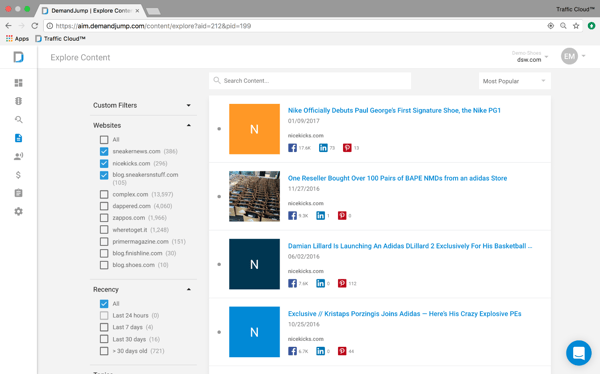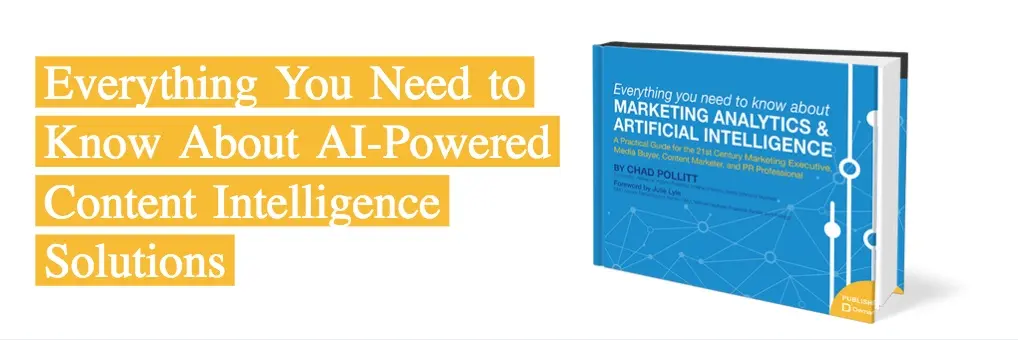Content intelligence has been getting a lot of buzz lately, and rightfully so. Content marketers are in need of some real strategic help on a big data scale. This is no secret, either. So much so, in fact, there are now at least 15 martech vendors that specialize in just this one aspect of AI-driven analytics—content intelligence.
The Content Marketing Institute’s own studies have shown that budgets for content marketing have been on the decline the last few years. Additionally, they’ve shown that perceived performance has been declining, too. This is reflected in both B2B and B2C brands. Content intelligence can help fix these problems.
What is content intelligence? There are many definitions floating around out there, but Curata’s seems to be one of the best.
“It’s the systems and software that transforms data into actionable insights for content strategy and tactics. Content intelligence means having the full context of an individual piece of content.”
While this definition is pretty good, it focuses exclusively on the “individual piece of content.” In fact, a well-rounded content intelligence system can also take a macro view of an entire blog, website and ecosystem, as well as each individual article.
This macro view helps uncover underserved content queries (prudent topics) and overserved content queries (topics to avoid) across an entire industry and represents valuable information that can inform a strategy. It also can uncover competitors’ content weaknesses and strengths.
Unstructured Data for Content Intelligence
Most content marketers have access to technology that helps parse structured big data and have so for many years—the tried-and-true, one-dimensional analytics solutions like Google Analytics. However, the problem with these first-generation solutions is that they mostly focus on structured data and output-based insights, which limits how much intelligence they can provide. They also dwell only one degree away from the websites they connect to. Meaning, insights derived are only from sites driving traffic directly to the website.
This is because the foundation of these solutions was built on technology from last decade. Today, we have a second-generation of analytics solutions powered by AI that can tackle both structured and unstructured big data to provide real content intelligence.
In addition, these solutions explore nearly 100% of the topical sphere of potential influence brands desire, not just the current 20% most are used to through Google Analytics or its clones.
This is significant because the level of insights derived are multiples greater than they’ve ever been. This second generation of analytics will be critical for content marketers who want to improve their performance and grow their budgets.
The below screenshot is a good example of what content intelligence can do. It starts off at the macro level and works all the way down to the individual blog post. At the macro level the AI-driven software goes out and maps a brand’s relevant digital ecosystem on the internet.

Unfortunately, most content intelligence solutions require the manual input of competitor websites or keywords and can’t actually figure it out on their own. For the solutions that can figure it out on their own, the macro-results would include websites that link to the brands, websites that link to those, and websites that link to those. It would include competitors, blogs, publications, affiliates and many other different types of websites and apps.
From there, micro data such as social shares, links, author, date, type of article, traffic, etc. can overlay the macro data. When sorted and organized through charts and lists, deep insights can reveal themselves like never before.
Predictive and Prescriptive AI-Driven Content Intelligence
A key differentiator for successful and unsuccessful brands executing content marketing in the near term will be their use of AI-driven content intelligence solutions. They can help determine what content to create to drive potential action at each stage of the buyer’s journey—which topics to focus on, and which topics to avoid (among other things).
Of the content intelligence solutions, there are three types: predictive, prescriptive and both. Predictive solutions predict future outcomes based on big data. Marketers still must make decisions based on these predictions. Prescriptive solutions parse structured and unstructured big data in order to recommend what to do next. Marketers don’t need to interpret the data into the best course of action in this scenario.
The complete solution does both predictive and prescriptive reporting. Content intelligence solutions that are only predictive in nature hearken back to the one-dimensional analytics we’re all used to—report information to the marketer who decides the best course of action. While better than the old school analytics, it still requires interpretation of the data.
It’s an exciting time to be a content marketer. AI is bringing a whole new level of insight into our world. It’s easy to feel overwhelmed at times considering there’s nearly 6,000 martech vendors to date. However, I hope that this post serves to shed some light on the content intelligence category.
This is one of many topics covered in my newest book, “ Everything You Need to Know About Marketing Analytics and Artificial Intelligence .” It covers AI’s impact on owned, earned and paid media and is available free for download.Chad Pollitt
Chad Pollitt is a Co-founder of Relevance, the world's first and only website dedicated to content promotion, news and insights, and is the current VP of Marketing for inPowered. He is also an Adjunct Professor of Internet Marketing at the Indiana University Kelley School of Business and Adjunct Instructor of Content Marketing at the Rutgers School of Business. A member of a Forbes Top 100 list, Chad authored "The Native Advertising Manifesto," “The Content Promotion Manifesto” and “51 Things Your Mother Taught You About Inbound Marketing.” He is a regular contributor to industry media outlets, including the Huffington Post, Guardian and Social Media Today.


